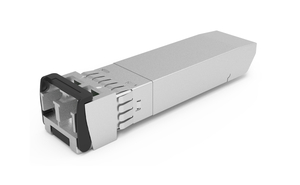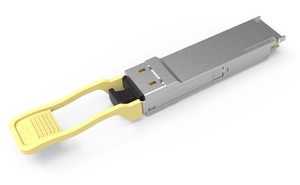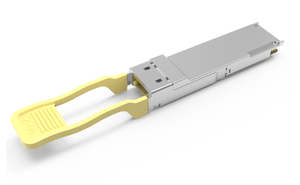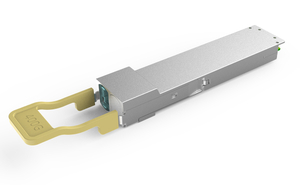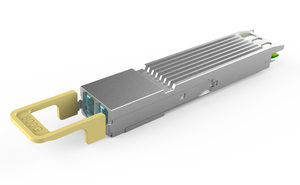• Data center & Networking Equipment
• Servers/Storage Devices
• High Performance Computing (HPC)
• Switches/Routers
• Telecom Central Offices (CO)
• Test and Measurement Equipment
Features
• Compliant to QSFP28 MSA
• SFF-8636 Specification
• Wide Operating Temperature(0°C~70°C)
• 4x25Gbps and 4x27.95Gbps 850nm VCSEL-based Transmitter
• RoHS compliant
Product Specification
Absolute Maximum Ratings (TC=25℃, unless otherwise noted)
Stresses in excess of the absolute maximum ratings can cause permanent damage to the device. These are absolute stress ratings only. Functional operation of the device is not implied at these or any other conditions in excess of those given in the operational sections of the data sheet. Exposure to absolute maximum ratings will cause permanent damage and/or adversely affect device reliability.
Parameter | Symbol | Min | Typical | Max | Unit | Notes |
Storage Temperature | TS | -40 | - | +85 | ℃ |
|
Maximum Supply Voltage | Vcc | -0.5 | - | 3.6 | V |
|
Operating Relative Humidity | RH | 0 | - | +85 | % | No condensation |
General Specifications (TC=25℃, Unless Otherwise Noted)
Parameter | Symbol | Min | Typical | Max | Unit | Notes |
Operating Case Temperature
| Tc
| 0 |
| 70 | ℃ | C-Temp |
-40 |
| 85 | ℃ | I-Temp |
Power Supply Voltage | Vcc | 3.15 | 3.3 | 3.45 | V |
|
Power Consumption |
|
|
| 3.5 | W |
|
Lane Baud Rate
|
BRLANE
|
| 25.78125 |
| Gbps |
|
| 27.9525 |
| Gbps |
|
Bit Error Ratio | BER |
|
| 1E-12 |
|
|
Data Speed Tolerance | ∆DR | -100 | - | +100 | ppm |
|
Operating Distance
| D
|
|
| 70 | m | @ OM3 MMF |
|
| 100 | m | @ OM4 MMF |
Transmitter Characteristics (TC=25℃, Unless Otherwise Noted)
Parameter | Symbol | Min | Typical | Max | Unit | Notes |
Center Wavelength | λ | 840 | 850 | 860 | nm |
|
RMS Spectral Width | RSM |
|
| 0.6 | nm |
|
Average launch power, each lane | Pf | -8.4 |
| 2.4 | dBm |
|
Optical Modulation Amplitude (OMA), each lane | Tx OMA | -6.4 |
| 3 | dBm |
|
Average launch power of OFF transmitter, each lane |
|
|
| -30 | dBm |
|
Extinction ratio | ER | 3 |
|
| dB |
|
Optical return loss tolerance |
|
|
| 12 | dB |
|
General Specifications (TC=25℃, Unless Otherwise Noted)
Parameter | Symbol | Min | Typical | Max | Unit | Notes |
Center wavelength | λ | 840 | 850 | 860 | nm |
|
Damage threshold |
| 3.4 |
|
| dBm |
|
Receiver sensitivity (OMA) | SOMA |
|
| -7.2 | dB | BER@5E-5 |
Receiver reflectance |
|
|
| -12 | dB |
|
LOS Assert | LOSA | -30 |
|
| dBm |
|
LOS De-Assert | LOSD |
|
| -10.5 | dBm |
|
LOS Hysteresis | LOSH | 0.5 |
|
| dB |
|
PIN Descriptions

Figure 1 – Pin Definitions
PIN | Logic | Symbol | Name/Description |
1 |
| GND | Ground |
2 | CML-I | Tx2n | Transmitter Inverted Data Input |
3 | CML-I | Tx2p | Transmitter Non-Inverted Data output |
4 |
| GND | Ground |
5 | CML-I | Tx4n | Transmitter Inverted Data Input |
6 | CML-I | Tx4p | Transmitter Non-Inverted Data output |
7 |
| GND | Ground |
8 | LVTTL-I | ModSelL | Module Select |
9 | LVTTL-I | ResetL | Module Reset |
10 |
| VccRx | ﹢3.3V Power Supply Receiver |
11 | LVCMOS-I/O | SCL | 2-Wire Serial Interface Clock |
12 | LVCMOS-I/O | SDA | 2-Wire Serial Interface Data |
13 |
| GND | Ground |
14 | CML-O | Rx3p | Receiver Non-Inverted Data Output |
15 | CML-O | Rx3n | Receiver Inverted Data Output |
16 |
| GND | Ground |
17 | CML-O | Rx1p | Receiver Non-Inverted Data Output |
18 | CML-O | Rx1n | Receiver Inverted Data Output |
19 |
| GND | Ground |
20 |
| GND | Ground |
21 | CML-O | Rx2n | Receiver Inverted Data Output |
22 | CML-O | Rx2p | Receiver Non-Inverted Data Output |
23 |
| GND | Ground |
24 | CML-O | Rx4n | Receiver Inverted Data Output |
25 | CML-O | Rx4p | Receiver Non-Inverted Data Output |
26 |
| GND | Ground |
27 | LVTTL-O | ModPrsL | Module Present |
28 | LVTTL-O | IntL | Interrupt |
29 |
| VccTx | +3.3 V Power Supply transmitter |
30 |
| Vcc1 | +3.3 V Power Supply |
31 | LVTTL-I | LPMode | Low Power Mode |
32 |
| GND | Ground |
33 | CML-I | Tx3p | Transmitter Non-Inverted Data Input |
34 | CML-I | Tx3n | Transmitter Inverted Data Output |
35 |
| GND | Ground |
36 | CML-I | Tx1p | Transmitter Non-Inverted Data Input |
37 | CML-I | Tx1n | Transmitter Inverted Data Output |
38 |
| GND | Ground |
Mechanical Specifications

Figure 2 - Mechanical Specifications
Digital Diagnostics Monitor Accuracy
Parameter | Symbol | Accuracy | Units | Notes |
Transceiver Case Temperature | DMI_TEMP | ±5 | ℃ | Over operating temp |
Supply voltage monitor absolute error | DMI _VCC | ±3 | % | Full operating range |
Channel Bias current monitor | DMI_IBIAS | ±10 | % | Per channel |
Channel RX power monitor absolute error | DMI_RX | ±3 | dB | Per channel |
Channel TX power monitor absolute error | DMI_TX | ±3 | dB | Per channel |
Product Information
Data Rate | Factor | Optical | Wavelength | Reach |
100G | QSFP28 | SR4 | MPO | 850nm | 100m/300m |
ESD Safety Cautions
This transceiver is specified as ESD threshold 1KV for high speed data pins based on Human Body
Model per ANSI/ESDA/JEDECJS-001. The units are subjected to 15kV air discharges during operation and 8kV direct contact discharges to the case. However, normal ESD precautions are still required during the handling of this module. This transceiver is shipped in ESD protective packaging. It should be removed from the packaging and handled only in an ESD protected environment.
Important Notice
The performance figures, data, and any illustrative material presented in this datasheet are typical and must be explicitly confirmed in writing by ZHAOLONG before they are deemed applicable to any specific order or contract.
By ZHAOLONG's policy of continuous improvement, specifications may change without prior notice. The publication of information in this datasheet does not imply exemption from patent or other protective rights held by ZHAOLONG or other parties. Additional details can be obtained from any ZHAOLONG sales representative.
Revision Record
Rev. | Comments | Author | Date |
A01 | Initial Release | James Chen | 10/01/2023 |
|
|
|
|
|
|
|
|
|
|
|
|
 English
English
 简体中文
简体中文





